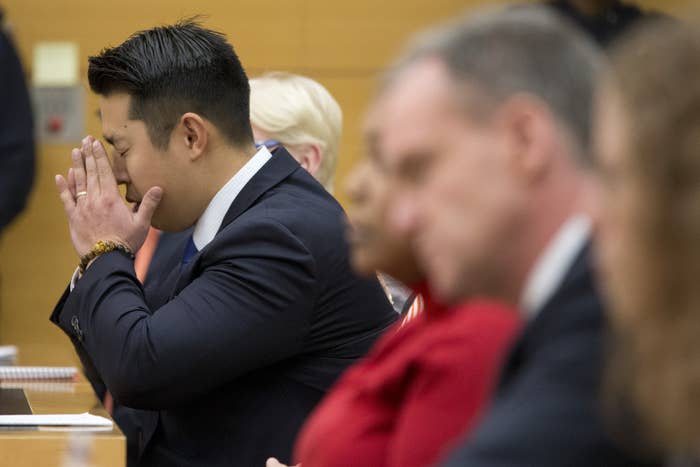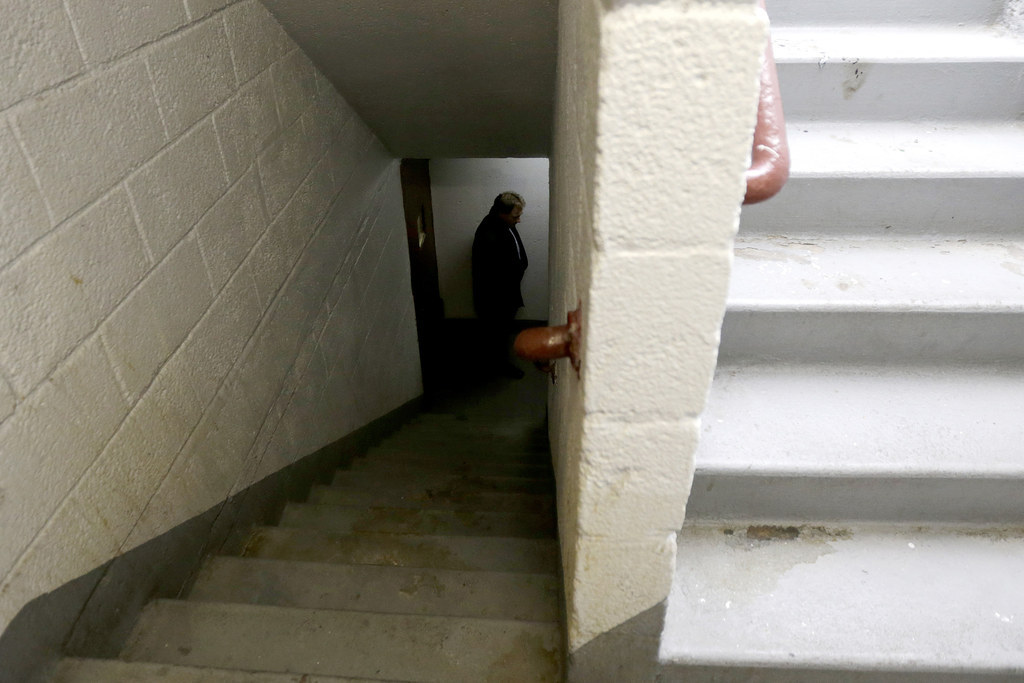
NEW YORK — New York City police officer Peter Liang was convicted Thursday of manslaughter and official misconduct for the fatal shooting of Akai Gurley, an unarmed black man, in the stairwell of a Brooklyn housing development.
A Brooklyn Supreme Court jury of seven men and five women was considering five counts relating to the Nov. 20, 2014, death of Gurley, who was killed when a bullet fired from Liang's gun struck a wall, ricocheted, and tore through the left side of his chest.
Liang, 28, was charged with manslaughter, criminally negligent homicide, reckless assault, reckless endangerment, and one count of official misconduct.
A police spokesperson told BuzzFeed News Liang was officially dismissed from the NYPD following the verdict. He will be sentenced on April 14, where he faces up to 15 years behind bars.
The jury reached a verdict around 6:40 p.m. Thursday evening after deliberating for 17 hours. As the guilty verdicts were read, gasps from the courtroom audience were heard and Liang was seen burying his face in his hands. Kim Ballinger, Gurley's domestic partner who sat in the front row — as she did every day of the trial — cracked a smile following the verdict.
Last month, Liang opted for a jury trial. Typically, police officers facing serious charges choose bench trials.
"We have great confidence in juries," Rae Koshetz told BuzzFeed News in January. "I just have always thought the collective wisdom and fairness of a jury is amazing."
As the verdict was read, District Attorney Ken Thompson said he leaned over and whispered to Gurley's mother, "I'm sorry."
"I told [her] sorry about what happened, sorry we are in this courtroom," Thompson said.
Outside the courthouse, the district attorney said today's verdict is "in no way a conviction of the NYPD" and acknowledged that officers have "the most dangerous job on earth."
Thompson went on to say that Gurley "was not just some name," but an innocent man, a son, and a father who "was just trying to go home" that night.
"No matter where you live, your life matters," Thompson said.

Scott Rynecki, Gurley's family attorney, said "no one is rejoicing" after the verdict.
"The message that has to be sent is that if a police officer does something wrong, he will be held accountable," Rynecki told reporters.
Liang, who testified in his own defense, said his gun accidentally went off when he entered the dark eighth-floor stairwell of the Pink Houses while conducting a vertical patrol — where officers ascend to the top floor of a housing development and walk down the stairs checking each floor.
He said when he entered the pitch-black stairwell, he heard a "quick sound" coming from his left side, which startled him and led him to "tense up" and fire his weapon.

"We are very disappointed in the verdict and believe that the jury came to an absolutely wrong decision," Patrolmen's Benevolent Association President Patrick J. Lynch said in a statement. "This was a terrible and tragic accident and not a crime. This bad verdict will have a chilling effect on police officers across the city because it criminalizes a tragic accident."
During the two-week trial, prosecutors and defense attorneys could agree on one thing: Liang did not intend to kill Gurley.
Prosecutors argued that Liang was "sworn to protect" Gurley, but failed to do so by having his gun out during the vertical patrol.
A number of witnesses, including current and former law enforcement officials, testified that police officers can use their discretion as to when to remove their firearm from their holster.
Another major point of contention was the fact that Liang did not administer first aid — such as CPR and chest compressions — to Gurley. During closing arguments, Assistant District Attorney Joseph Alexis contended that Liang is not an "untrained civilian," but a qualified NYPD officer who panicked in the line of duty.
Prosecutors called on a number of instructors from the police academy to testify about the training recruits receive. While they described to jurors what each officer is taught, Liang and his partner, Shaun Landau, testified that they received minimal CPR training and were therefore unable to render aid.
The medical examiner who conducted Gurley's autopsy said basic CPR would not have saved Gurley — his wound required more extensive medical attention.
Gurley's girlfriend, Melissa Butler, who was with him at the time of the shooting, did CPR, following instructions the EMS dispatch was directing over the phone.
"No matter what happened in the police academy with police training, you can rest assured Peter Liang, Shaun [Landau], and every other graduate of the academy was better equipped, better trained, and able to do the chest compressions Melissa Butler was forced to do while she knelt in [Gurley's] blood and urine," Alexis said.
Prosecutors claim Liang also failed to alert his supervisors that his gun went off because he was worried he would be fired. Landau, his partner, testified that moments after the discharge, Liang said, "I'm fired."
Liang's lawyers disagree, claiming that the rookie officer did in fact try to call his sergeant, even before he realized his bullet hit Gurley, but Landau yanked the cell phone from his hand and hung up the call.
Once Liang saw Gurley lying wounded on the fifth-floor stairwell landing, defense lawyers said he immediately radioed for an ambulance, but the transmission did not go through since there is poor reception in the stairwells.
Liang's lawyer, Robert Brown, called the incident a "freak accident," stating the unlikelihood a bullet would kill someone from a ricochet.
"This is not an accident. This is an officer who couldn't properly handle his gun," Alexis said. "It's no accident [the bullet] hit the wall steps away from where Akai Gurley stood."
